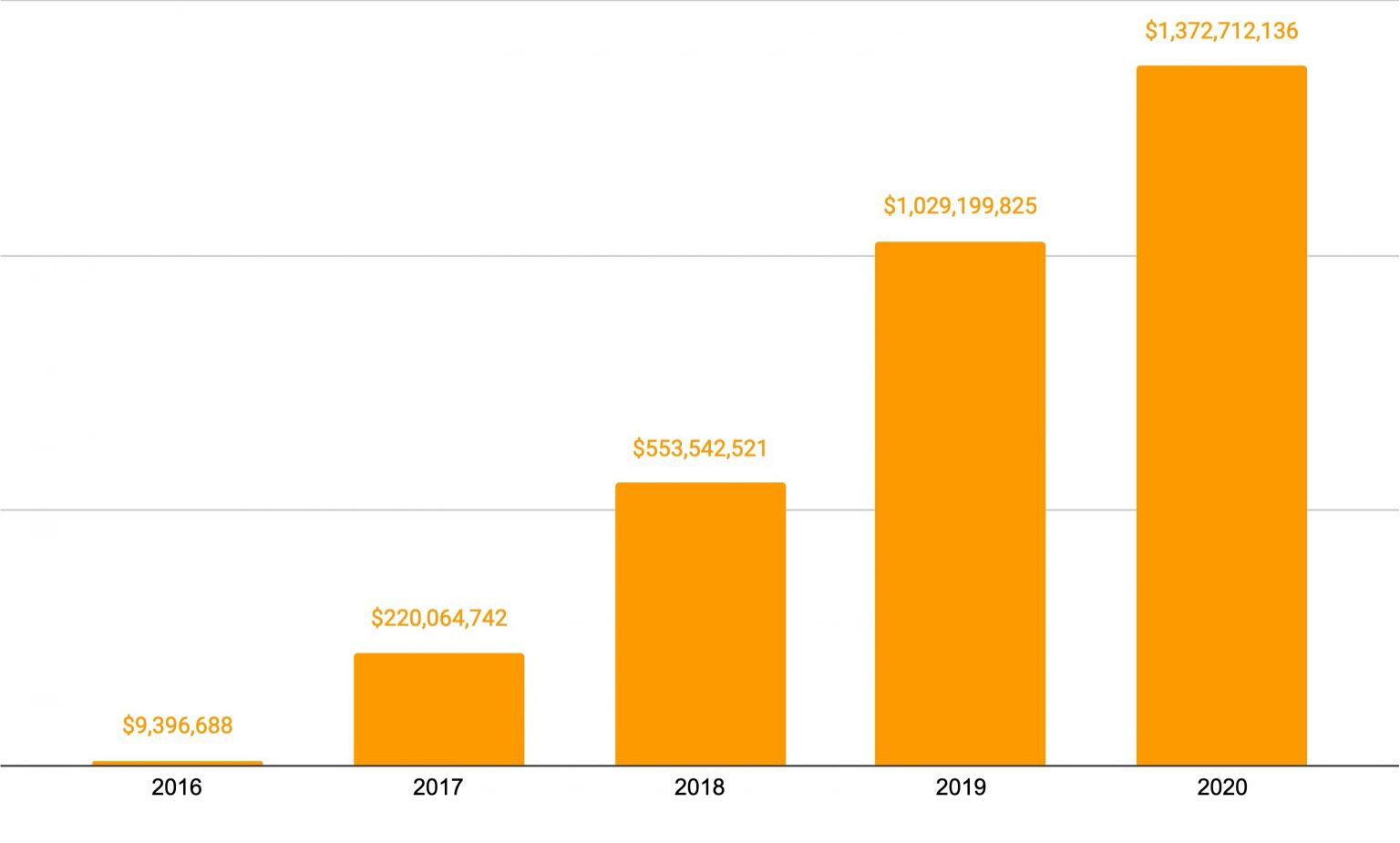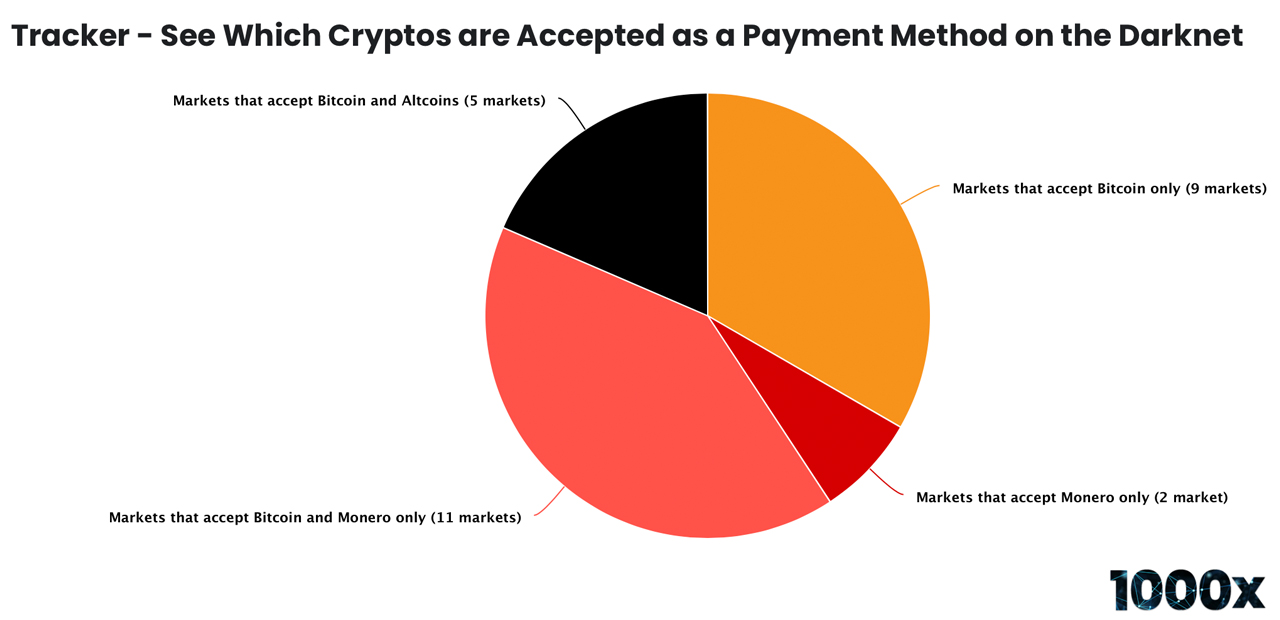[ad_1]

At the end of 2020, darknet markets (DNM) set new records as marketplaces like White House and the Russian-language DNM Hydra led the pack. A report published on May 25, shows Hydra saw a 624% year-over-year growth rate in three years, and researchers estimate roughly 75% of illicit DNM transactions stem from the Russian marketplace. Moreover, the privacy coin monero is seeing a lot more vendor acceptance on DNMs these days. On June 29, monero captured 84% of vendor acceptance on three of the top marketplaces.
The Complex Russian Darknet Market Hydra Eclipses 26 Marketplaces
While cryptocurrency markets are down in value, the use of darknet markets has continued to rise. DNMs have managed to stay lucrative throughout Covid-19 and stats indicated that while the world was locked down, DNM use was flourishing.
Many DNMs are operational today as reports and data show that the two largest darknet markets are Hydra and White House Market. Other notable DNMs in the second half of 2021, include Cannazon, Cannahome, Torrez Market, Dark0de Reborn Market, Vice City, Aurora, and the Majestic Garden.

At the end of May, blockchain forensics firms Chainalysis and Flashpoint threat intelligence published a report that does a deep dive into the rise to prominence of Hydra. The report called “Hydra: Where Cryptocurrency Roads All Lead to Russia and Go Dark,” explains how Hydra administrators impose strict rules for sellers using the DNM.
Despite Hydra’s strict rules, the report highlights that Hydra remains continuously profitable. Furthermore, vendor withdrawals are funneled through Russian exchanges and service operators, the report details. The Flashpoint and Chainalysis report adds:
Hydra market activity has skyrocketed since its inception, with annual transaction volumes growing from a total of $9.40 million in 2016 to north of $1.37 billion by the end of 2020. Observed through blockchain analysis, we see a staggering 624% year-over-year growth rate for Hydra in its three most recent years 2018 to 2020.
Monero Acceptance on DNMs Continues to Rise
Darknet tracker data provided by the blockchain analytics provider 1000x Group indicates there are around 27 DNMs in operation today. Nine of the markets accept BTC only, five markets accept BTC and a variety of coins, eleven markets accept BTC and monero (XMR), and two markets accept XMR only. Bitcoin only markets include Darkfox, Hydra, Vice City, Aurora, Majestic Garden, Neptune, Mega, Global Dreams, and Flugsvamp 3.0. Meanwhile, marketplaces dedicated to monero only include White House Market and Archetyp Market.
Being one of the top markets like Hydra, White House Market (WHM) also has strict rules and monero (XMR) only acceptance is one of them. WHM also requires 2FA, the use of PGP, and the site is often down from DDOS attacks over the years. The DNM has thousands of vendors and claims to have more than a million users in 2021. WHM picked up a huge amount of customers and vendors after the fall of Dream Market and there’s more than 50,000 products listed today. The DNM White House Market also makes a 4% commission on everything sold on the deep web portal.

Statistics show that monero (XMR) has seen a significant uptick in vendor acceptance on three specific fully operational DNMs. While BTC still dominates on DNMs, XMR commands an appreciable amount of acceptance on these markets. DNM tracker data shows during the last two weeks of May, XMR vendor acceptance was above 50%.
During the first two weeks of June, monero saw a dip under the 50% handle and hit a low of 37.60% on June 8. However, monero vendor acceptance climbed to 84% on June 29 and has been above the 50% region ever since. When monero saw a low in mid-June, there was a higher percentage of litecoin (LTC) vendor acceptance at the time. The vendor acceptance rate tracks vendor acceptance through Versus Market, Cannahome, and Cannazon.
Does Hydra Have a Semi-Official Sanction from Russian Leaders?
Meanwhile, as Hydra has become one of the largest DNMs worldwide, after surpassing the older Russian DNM Ramp, Joe Biden’s administration is focused on Russia’s involvement with these types of actors. Biden has been talking about Russia to the press and he wants Russia to crack down on cyber threats like ransomware.

Following the Colonial Pipeline attack and the Kaseya breach, Biden told the press that he spoke with Russian president Vladmir Putin on Friday. Biden said he told Putin he must “take action” against these cyber actors.
“I made it very clear to [Vladmir Putin] that the United States expects when a ransomware operation is coming from his soil even though it’s not sponsored by the state, we expect them to act if we give them enough information to act on who that is,” Biden stressed this week.
Now the ransomware is one thing, but Bloomberg contributor Leonid Bershidsky thinks there’s a possibility that Hydra has some kind of “semi-official sanction” from Russian leaders. Bershidsky notes in a recent article that Russia’s “Hydra, its krysha, or protection, is the elephant in the room.” The author explains that Putin doesn’t really have any incentive to crack down on DNMs and he also believes that “retaliatory action from the U.S. isn’t compelling enough.” Bershidsky’s opinion editorial concludes:
As things stand, Putin can let the likes of Hydra worry about that prospect. And if they are crushed, others can take their place. The dark web is nothing if not resilient.
What do you think about the increased usage of darknet markets and the growth of Hydra? What do you think about monero vendor acceptance increasing on DNMs as well? Let us know what you think about this subject in the comments section below.
Image Credits: Shutterstock, Pixabay, Wiki Commons
Disclaimer: This article is for informational purposes only. It is not a direct offer or solicitation of an offer to buy or sell, or a recommendation or endorsement of any products, services, or companies. Bitcoin.com does not provide investment, tax, legal, or accounting advice. Neither the company nor the author is responsible, directly or indirectly, for any damage or loss caused or alleged to be caused by or in connection with the use of or reliance on any content, goods or services mentioned in this article.
[ad_2]
Source link



